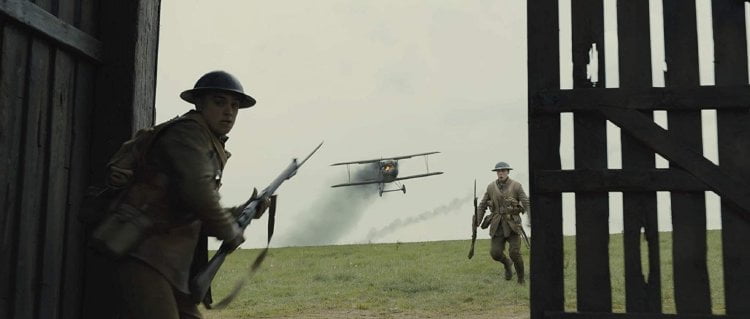1917

Lance Corporals Blake (Dean-Charles Chapman) and Schofield (George MacKay) are given a mission impossible: cross the deadly no-man’s land and infiltrate the enemy lines to call off a planned attack that would send a battalion of 1600 men into a meat grinder in “1917.”
Laura's Review: C+
In the British trenches bordering No Man’s Land, General Erinmore (Colin Firth) has learned that the Germans’ retreat is actually a ploy to ambush a planned attack by the 2nd Devons, one which will guarantee a massacre. Lance Corporal Blake (Dean-Charles Chapman, "Blinded by the Light") is directed to find another man to accompany him to cross enemy territory and deliver a message to call off this attack, potentially saving 1,600 British soldiers including his older brother (Richard Madden, "Rocketman"). Blake taps Lance Corporal Schofield (George MacKay, "Pride," "Ophelia") and the two begin a perilous journey in “1917.”
Director Sam Mendes ("American Beauty," "Skyfall") racks up his first screenwriting credit (with 'Penny Dreadful's' Krysty Wilson-Cairns) by condensing his grandfather Lance Corporal Alfred H. Mendes’ war stories into one epic journey. The film has many standout moments, but Mendes’ decision to film this (by revered veteran cinematographer Roger Deakins) as a virtual one take à la “Birdman” turns his movie into a videogame where our heroes move forward across a varying landscape stopping for episodic incidents to unfold. In one instance, this tactic is so illogically plotted that Blake and Schofield grapple with the crash landing of a German dogfighter and its pilot at a farmhouse only to discover seemingly oblivious British troops right behind it in the next ‘scene.’
Blake is the immediately likable one of our pair of soldiers, bravely determined to save his brother and other fellow soldiers, his open face innocent and hopeful. Schofield is far more reluctant, considering the mission a near death sentence, resentful of being tapped by Blake. Their muddy advance across No Man’s Land is a horror of barbed wire and the rotting corpses of men and horses (at one point, Schofield puts down his hand to balance himself – right through a dead man’s chest cavity).
Once they’ve made it, they send up the flare requested by York commander Lieutenant Leslie (Andrew Scott), the last man they’d seen before leaving the trenches, then enter the far more sophisticated underground tunnels abandoned by the Germans. Surviving a trap laid by the departing enemy brings the two closer together. Before that message makes it to Colonel MacKenzie (Benedict Cumberbatch), there will be encounters with devastated farms, an unmilked cow, a blown out bridge, a lone sniper and Lauri (newcomer Claire Duburcq), a terrified Frenchwoman caring for an abandoned baby in a German held town. Other British troops assist along the way, Captain Smith (Mark Strong, in a notable, understated yet compassionate performance) warning that their message be delivered with a witness, MacKenzie’s gung-ho, full-speed-ahead attitude another potential obstacle.
Mendes’ overall concept is reminiscent of Peter Weir’s far superior “Gallipoli,” another WWI epic about two messengers who try to avert a senseless slaughter. While recognizing the technical challenge Mendes presented himself, Deakins and his actors, the one take device calls too much attention to itself, however well Deakins pulls it off (editor Lee Smith cuts the 7-8 minute takes together seamlessly). Thomas Newman’s orchestral score is quite lovely, evolving from quiet emotion to grandeur and back again.
With the exception of MacKay’s deft 180 degree character arc and an admittedly moving final act, “1917” left this critic chilly.
Robin's Review: B+
Director Sam Mendes based the screenplay, co-writing with Krysty Wilson-Cairns, on accounts told to the helmer by his paternal grandfather, Alfred Mendes, and his experiences during the Great War. Here, two young soldiers must face death on the battlefield to save what could be a truly lost battalion, one of whom is Blake’s brother. As such, “1917” is both a heroic mission to save lives and the tale of the epic, dangerous journey faced by our two heroes.
The technical draws to “1917” are several, including realistic depictions of trench warfare that are incredibly and accurately detailed. The duo face great risk traversing the battlefield – though the sound of rifle fire is only in the distance for the first hour, artillery explosions are ever-present – and are observers of the carnage of the WWI battlefield. But, their mission is critically important as they must race against the clock to stop the attack in time, ramping up he story’s urgency.
But this all would be a pretty conventional war flick except for the film’s tour-de-force technical achievement. The filmmakers, with the magic of long takes and deft editing, effectively give the illusion of a single, 119 minute take. At first, the dizzying and manic movement of the camera is a bit disconcerting but, as we get to know the two characters, the “single take” begins to flow with the battle action.
“1917” is a straightforward war story that is scaled to visually epic proportions. Techs are exemplary and, besides the two leads, the cadre of character actors, like Mark Strong as the officer giving the two soldiers their potential death warrant and Benedict Cumberbatch as the commander of the endangered battalion, give their cameo roles substance

